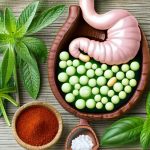Gas and bloating are incredibly common digestive complaints that can cause significant discomfort for many people. Often triggered by diet, lifestyle factors, or underlying conditions, these issues frequently lead to feelings of fullness, abdominal pressure, and even pain. While over-the-counter remedies offer temporary relief, growing interest surrounds the potential benefits of probiotics – live microorganisms intended to promote a healthy gut microbiome – in managing these frustrating symptoms. Understanding how probiotics interact with our digestive system is key to evaluating their role in alleviating gas and bloating.
The human gut is home to trillions of bacteria, both beneficial and potentially harmful. Maintaining a balance between these microbial populations is crucial for optimal digestion and overall health. Disruptions to this delicate ecosystem, caused by factors like antibiotic use, poor diet, or stress, can lead to an overgrowth of gas-producing bacteria, resulting in the unpleasant symptoms we associate with bloating and flatulence. This is where probiotics come into play, offering a potential avenue for restoring microbial balance and improving digestive function.
What are Probiotics?
Probiotics aren’t single entities; they encompass a diverse range of bacterial strains, each with potentially unique properties and effects. Commonly found in fermented foods like yogurt, kefir, sauerkraut, and kimchi, probiotics can also be consumed as dietary supplements. The effectiveness of a probiotic often depends on the specific strain, dosage, and individual gut microbiome composition.
The key function of probiotics is to help repopulate the gut with beneficial bacteria. These “good” bacteria compete with harmful ones for resources, strengthen the intestinal barrier, and even produce substances that inhibit the growth of undesirable microbes. However, it’s important to remember that probiotic supplementation isn’t a one-size-fits-all solution, and research is ongoing to determine which strains are most effective for specific digestive issues.
How Probiotics May Impact Gas & Bloating
Probiotics can influence gas and bloating through several mechanisms. By altering the gut microbiome composition, they may reduce the overall production of gas by harmful bacteria. Additionally, certain probiotic strains can improve carbohydrate metabolism in the gut, reducing the amount of undigested food reaching the colon – where fermentation (and thus, gas production) occurs.
Specific Strains & Their Potential Benefits
Research suggests that some probiotic strains are more promising than others when it comes to easing gas and bloating. Bifidobacterium infantis has shown particular promise in studies focusing on irritable bowel syndrome (IBS), a condition often characterized by bloating, abdominal pain, and altered bowel habits. Other strains, like certain Lactobacillus species (L. plantarum, L. acidophilus) have also been investigated for their ability to reduce gas production and improve digestive comfort. However, it’s crucial to note that results can vary significantly between individuals and studies.
The Role of Gut Motility & Fermentation
Bloating is often linked to both excessive gas production and impaired gut motility – the speed at which food moves through the digestive tract. Some probiotic strains may help improve gut motility, preventing food from sitting in the colon for too long and allowing less time for fermentation to occur. Reduced fermentation leads to less gas production. The interplay between these factors is complex, and probiotics don’t necessarily address all causes of bloating simultaneously.
Considerations for Supplementation & Dietary Sources
When choosing a probiotic supplement, look for products that clearly list the specific strains included, as well as the colony-forming units (CFUs) – indicating the number of live bacteria per dose. It’s also advisable to consult with a healthcare professional before starting any new supplement regimen, especially if you have underlying health conditions or are taking other medications. Dietary sources of probiotics, like fermented foods, can be incorporated into a healthy diet as part of a broader approach to gut health. However, the probiotic content in these foods can vary significantly and may not always deliver the same concentration as a targeted supplement.
Ultimately, managing gas and bloating often requires a multifaceted strategy that includes dietary adjustments, lifestyle modifications, and potentially, probiotic supplementation. While probiotics hold promise as a tool for improving digestive comfort, understanding their limitations and choosing appropriate strains are essential for maximizing their potential benefits. Further research is continually expanding our knowledge of the intricate relationship between probiotics and gut health.


















